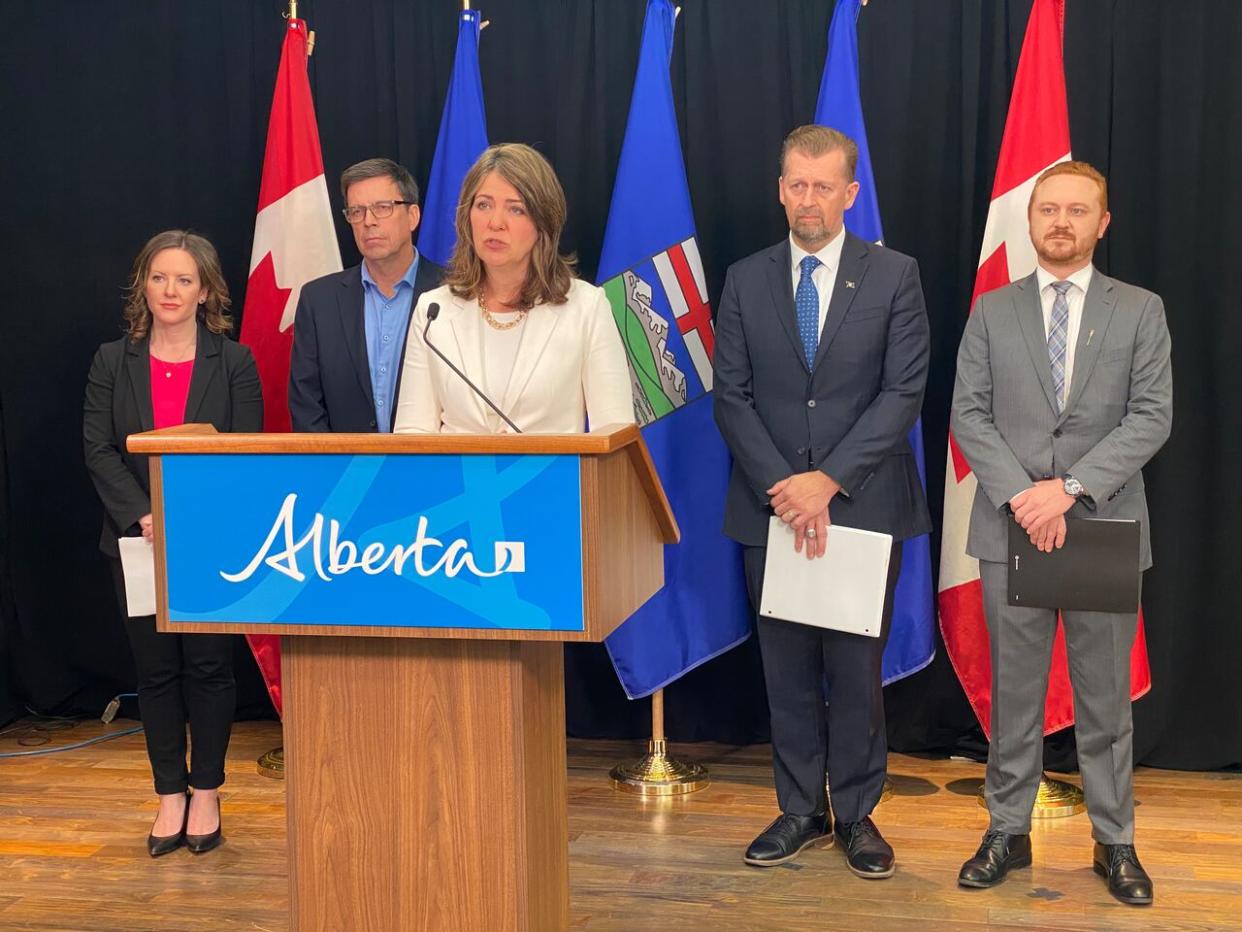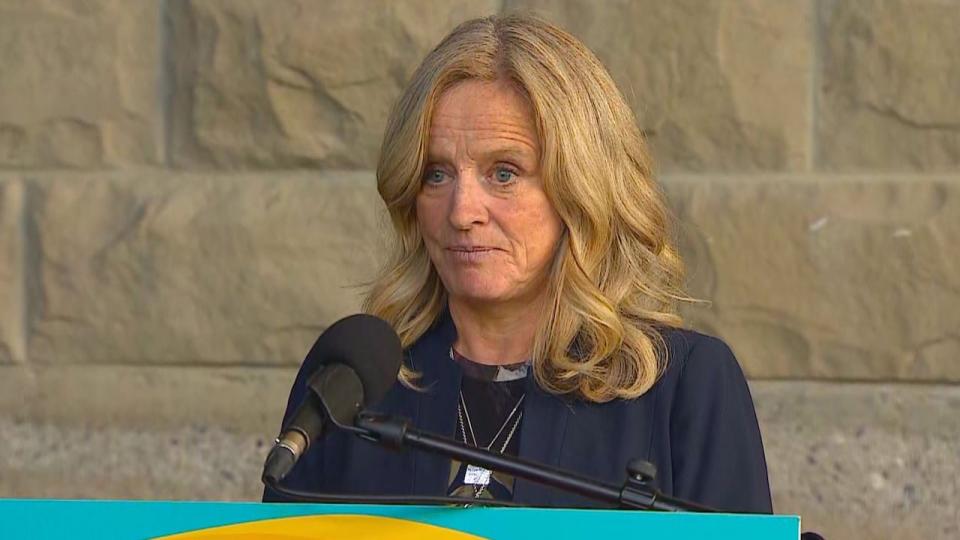New bill would allow Alberta government to take command of local emergencies

The Alberta government wants to give itself new powers to speed its response in managing forest fires, floods, droughts and other emergencies.
Bill 21, tabled Wednesday by Public Safety and Emergency Services Minister Mike Ellis, proposes several amendments to the Emergency Management Act and five other pieces of legislation.
If passed, the legislation would also move Alberta's fixed provincial election date to Oct. 18, 2027, about five months later than the currently scheduled date of May 31, 2027.
At a news conference, Premier Danielle Smith said the record-setting May 2023 wildfires coincided with a provincial election campaign, which made the emergency difficult to manage.
"It was bizarre for ministers and other candidates to have to go through these motions while so much of Alberta was burning and so many Albertans were out of their homes," Smith said.
Cabinet ministers lacked access to government information and devices during the campaign period, while they were tasked with making rapid and high-stakes decisions, she said.
Election dates in October are less likely to conflict with natural disasters in the province, she said.
During the writ period, the provincial government goes into "caretaker mode," limiting the power of elected officials and handing responsibilities to top civil servants.
Some candidates running in areas affected by the spring 2023 wildfires temporarily suspended campaigning to respond to the crisis. Elections Alberta moved some polling stations to accommodate evacuees.
A new election date also necessitates changes to the legislation governing senate elections and campaign financing, which are also included in the bill.
The growing threat of natural disasters such as larger, more ferocious wildfires prompts the need for the province to be able to rapidly assume command of a local emergency, Smith said.
If passed, Bill 21 would allow the government to take over emergency management in a municipality or region if local leaders ask for more help, become overwhelmed and unable to respond, and where local priorities are at "cross purposes" with the province, said briefing notes provided to reporters.
The government could also do this without the blessing of local leaders.
The bill would also require local authorities to provide more information to the province during a local state of emergency.

Government officials including Alberta Premier Danielle Smith and Edmonton Mayor Amarjeet Sohi visited wildfire evacuees at the Edmonton Expo Centre in May 2023. ( Wildinette Paul/Radio-Canada)
Smith said local authorities asked for these measures, saying the province was too slow to react to past disasters.
"Everybody's come to the same conclusion — that we can't sit back and wait for the fire to jump the border and burn down Slave Lake or burn down Fort McMurray or potentially burn down Drayton Valley," she said.
Alberta Municipalities president Tyler Gandam said in an interview Tuesday afternoon that municipalities asked for extra resources and help during the 2023 wildfire season, but he's unaware of any municipality asking for the province to take control of the emergency response.
Bill 21 is the third piece of legislation the government has tabled in the last month without consulting first with municipalities, despite having potentially profound effects on municipalities, Gandam said.
The organization needs time to understand what problems the government is trying to solve with this latest bill, he said.
Although Wednesday's announcement did not make reference to the role of climate change leading to more catastrophic natural disasters, Smith said the government does have to be concerned about climate change, but must also send a message to the public to be cautious when burning garbage, lighting campfires or driving vehicles that could lead to wildfires.
More control to respond to fire and floods
If passed, the bill would give the provincial government the authority to fight fires on any Crown land, including land that is outside its forest management area. Right now, it would be a municipality's responsibility to battle a blaze on Crown land within its borders, although it can ask for provincial help.
The bill would clarify the province's power to fight fires in Alberta's eight Métis settlements.
The bill would also authorize firefighting crews to remove private buildings or fences if they need to build a fireguard to protect a community.
Although Alberta has never had to declare an emergency under the Water Act, past floods and currently parched land are prompting government officials to prepare for that possibility. The government says it needs to be able to control the flow of scarce water to prioritize human and animal health and safety.
If the province declares a water emergency, the bill would allow cabinet to decide how to prioritize water use in an area, and when water licence holders can and cannot divert water.
Right now, the legislature must pass a bill to move water between major basins. Bill 21 would allow the province to move water during an emergency.
Some drought or flood mitigation initiatives could also skip approval processes during an emergency, and emergency decisions would be protected from appeal.
People responding to the emergency could also go onto private land and temporarily place equipment, such as hoses.

Alberta NDP Leader Rachel Notley questions the UCP government's motivation for moving the province's fixed election date four-and-a-half months later. (CBC News)
Bill could give government more time in power
NDP Leader Rachel Notley, who was premier from 2015 to 2019, said government leaders lose some access to information during an election campaign, but that lack of information is "not quite the problem that they're trying to claim it is" during an emergency.
Ministers would still have access to emergency briefings from staff during a campaign. Top public servants could give media briefings instead of politicians, she said.
Notley said the government should have consulted with the Opposition before proposing a timing change, or moved the fixed election date to October 2026. She said the proposed move, which could potentially extend the UCP's rule by more than four months, is "self-serving and opportunistic."
Alberta Municipalities president Gandam questioned why the election date change was necessary more than three years in advance of the next provinicial election.


